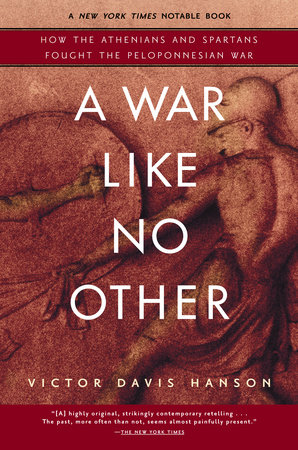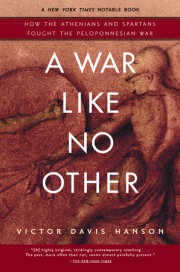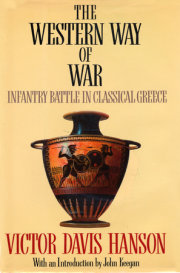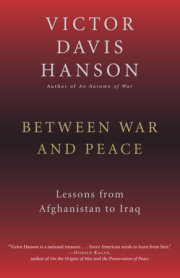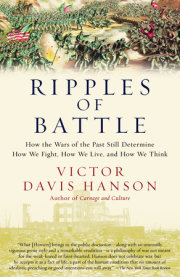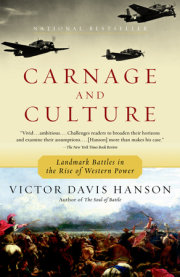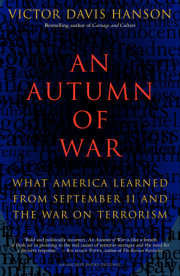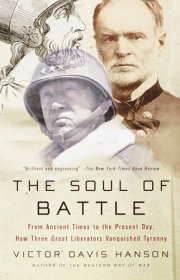Chapter 1
Fear
Why Sparta Fought Athens (480–431)
Our Peloponnesian War
The Peloponnesian War is now 2,436 years in the past. Yet Athens and Sparta are still on our minds and will not go away. Their permanence seems odd. After all, ancient Greek warring parties were mere city-states, most of them smaller in population and size than Dayton, Ohio, or Trenton, New Jersey. Mainland Greece itself is no larger than Alabama, and in antiquity was bordered by empires like the Persian, which encompassed nearly one million square miles with perhaps 70 million subjects. Napoleon’s army alone had more men under arms by 1800 than the entire male population of all the Greek city-states combined. In our own age, more people died in Rwanda or Cambodia in a few days than were lost in twenty-seven years of civil war in fifth-century b.c. Greece.
Nor were Greeks themselves especially lethal warriors, at least by later historical standards. Rudimentary wood and iron of the preindustrial age, not gunpowder and steel, were their shared weapons of destruction. Even the soldiers themselves who fought the war were not much more than five foot five and 130 pounds. They were often unimpressive middle-aged men who would appear as mere children next to contemporary towering two-hundred-pound GIs.
Yet for ancient folk so few, small, and distant, their struggle during the Peloponnesian War seems not so old even in this new millennium. During the weeks after September 11, 2001, for example, Americans suddenly worried about the wartime outbreak of disease in their cities. In October and November 2001, five died and some twenty-four others were infected from the apparently deliberate introduction of anthrax spores by unknown terrorists. During the spring of 2003 a mysterious infectious respiratory ailment in China threatened to spread worldwide, given the ubiquity of low-cost transcontinental airfare. The panic that ensued in Washington and Peking during a time of global tension evoked ancient wartime plagues, such as the mysterious scourge that wiped out thousands at Athens between 430 and 426. Similarly, at about the same time, Sicily, Melos, and Mycalessus were all cited in contemporary media, as millennia later the world once again watched military armadas head out to faraway places, saw democracy imposed by force, and read of schoolchildren killed by terrorist bands.
But even before September 11 the Peloponnesian War was not really ancient history. Scholarly books regularly appeared with titles like War and Democracy: A Comparative Study of the Korean War and the Peloponnesian War, or Hegemonic Rivalry: From Thucydides to the Nuclear Age. Thucydides had long been assigned reading at the U.S. Army War College. And an array of statesmen such as Woodrow Wilson, Georges Clemenceau, and Eleuthérios Venizélos either taught or wrote about Greek history, in which the use of Thucydides’ war loomed large. More recently, controversial thinkers known as neoconservatives (“the new conservatives”) were for a time influential in American strategic thinking, and the text that they purportedly consulted frequently was once more Thucydides’.1
What is it about this particular ancient clash that causes it to be called to mind during our present wars? Why were the conflict’s supposed lessons both astutely and clumsily applied to most of our own struggles of the last century? Russia—or was it really Hitler’s Germany?—supposedly resembled oligarchic Sparta in its efforts to destroy a democratic, seafaring America. Did not the Cold War, after all, similarly divide up the world into two armed leagues, led by superpowers who had united for a time against the common enemy only later to face off for decades of bipolar hostilities? Was the Sicilian expedition a precursor to Gallipoli, Vietnam, or any proposed great democratic or imperial crusade abroad? Or does the disaster at Syracuse show, as Thucydides oddly concluded, what happens when folks at home do not support the troops abroad? Because Thucydides first framed the important issues that haunt us still, we naturally return to his original and seemingly unimpeachable conclusions.
The Sorrows of War
Why exactly is this rather obscure ancient war between minuscule Athens and Sparta still so alive, and used and abused in ways that other ancient conflicts, such as the Persian Wars (490, 480–79) and Alexander the Great’s conquests (334–323), are not? Many intriguing reasons come to mind.
First, it was a brutal and very long struggle. King Xerxes and his enormous Persian military were routed from Greece in about two years. Alexander destroyed the later Persian Empire in a third of the time it took Sparta to defeat Athens. Lasting twenty-seven years, or almost a third of the fabled fifth century of classical Greece, the Peloponnesian War, like the Second Punic War, the Thirty Years War, or the Hundred Years War, was a mess that eerily crossed generations. Those born after the first years of the war often fought and died in the fighting before it was over.
So the catastrophe devoured entire families across generations. The carnage reminds us of imperial Britain tottering after the First World War, the end of empire, aristocracy, and unquestioned patriotism all inextricably tied to trenches that gobbled up the British elite. The Peloponnesian War spared few Greeks, regardless of wealth or family connections. The “great houses” of Athens, or so the postbellum lament went, were almost wiped out.2
Take the most famous branch of the exalted Alcmaeonid family. Pericles, the spiritual and political leader of Athens, died of the plague at Athens in 429 in only the third season of the war. His sister, also in her sixties, had perished a year before from the same epidemic, along with his sons Paralus and Xanthippus. Neither of those young men reached thirty.
Later, a much younger bastard son, Pericles the Younger, was elected an Athenian general. He was in part responsible for the great sea victory at Arginusae, some twenty-three years after his father’s death. Yet the younger Pericles was subsequently executed by an Athenian jury in an infamous scapegoating frenzy during the battle’s aftermath. And Pericles’ nephew, the thirty-two-year-old bright and upcoming Hippocrates, fell at the forefront of the battle of Delium (424). Thirty years’ worth of plague, political intrigue, general hysteria, and enemy spears more or less wiped out the family of the most powerful man at Athens.
The war also started at the high-water mark of Greece’s great Golden Age (479–404). Yet the attendant calamity ended for good such great promise that started with the defeat of the Persians (479). The capitulation of Athens (404) and the end of the fifth-century Golden Age remain symbolically interconnected events to this day. They are also loosely associated as well with the near-contemporaneous trial and execution of Socrates (399), the last and greatest casualty of a once wonderful world seemingly gone mad in a few decades. Contemporaries, among them the comic poet Aristophanes, believed that with the end of the Peloponnesian War, Attic tragedy as emblemized by Aeschylus, Sophocles, and Euripides had lost its splendor.
Indeed, players in and observers of the war were the greats of Hellenic civilization—Alcibiades, Aristophanes, Euripides, Pericles, Socrates, Sophocles, Thucydides, and others—many of whom flourished, were discredited, or perished because of their involvement in the fighting. Much of the greatest classical literature, such as Aristophanes’ Acharnians, Euripides’ The Trojan Women, Plato’s Symposium, and Sophocles’ Oedipus the King, either deals with issues of the war or employs the conflict as dramatic landscape, leaving with us the depressing possibility that war, not peace, prompted the greatest explosion in the Greek creative genius, a frenzied outburst before a weary collapse. Most Greeks saw the bloody struggle through the eyes of Athens, whose writers enjoyed a near monopoly on reporting, praising, and condemning the war—shocked that in just three decades the entire dream of a cultural renaissance was brought to an end. So north of the Isthmus of Corinth the fight was soon known universally as the “Peloponnesian War,” the conflict against those awful supermen who inhabited the southern peninsula of Greece—not, as the parochial Peloponnesians saw it, as a Spartan-led struggle against imperialists in an “Athenian War.”
The Peloponnesian War pitted against each other two Greek states that were antithetical in nearly every respect. Athens had 300 warships, a population of over 300,000 residents, a fortified port, a vast countryside, some 200 tribute-paying subject states abroad, and plenty of coined money. Sparta was landlocked. About 160 miles to the south, it relied on an army of only 10,000 infantrymen—less than half of them full citizens—to enforce rule over 250,000 inferiors and serfs, and a hegemony of neighboring communities, without any tradition of either seapower or cosmopolitan culture.
Rightly or wrongly, the fighting was assumed to be a final arbitrator of the contrasting values of each. Which would prove to be the more viable ideology: cultural and political liberalism or a tough, insular conservatism? Does an open society reap military advantages from its liberality or succumb to a license unknown in a regimented and militaristic oligarchy? And who is the most resourceful in an asymmetrical war when both sides either cannot or will not face each other in conventional battle: the ships of a “whale” like imperial Athens or the ponderous armies of the “elephant” Sparta?
Thucydides
Then there is the matter of Thucydides himself. Greece’s preeminent historian was not merely an analytical and systematic writer of a great extant military history of Sparta and Athens. He was also a brilliant philosopher who tried to impart to the often obscure events of the war a value that transcended his age. In his own boast, his narrative would prove to be “a possession for all time,” far more important than the actual war itself.3
Precisely because of this didactic nature of Thucydides’ lengthy narrative—predicated on the belief that human nature is unchanging across time and space and thus predictable—the conflict of Athens and Sparta is supposed to serve as a lesson for what can happen to any people in any war in any age. A central theme is the use and abuse of power, and how it lurks behind men’s professions of idealism and purported ideology. What men say, the speeches diplomats give, the reasons states go to war, all this “in word” (logos) is as likely to cloak rather than to elucidate what they will do “in deed” (ergon). Thucydides teaches us to embrace skepticism, expecting us to look to national self-interest, not publicized grievances, when wars of our own age inevitably break out.
Still, Thucydides was not an abstract theorist but a chief player in the war he wrote about. He nearly died of the plague and was cooped up in the city with tens of thousands of other Athenians who sought refuge there from the invading Peloponnesians. He fought and lost to the cagey Spartan commander Brasidas as an Athenian general in the struggle over the northern allied city of Amphipolis. For that setback he was unfairly exiled in his late thirties by an angry people back home (423), whose leaders are later prominent in his own history. Like Caesar’s and Napoleon’s, Thucydides’ writing is inextricably mixed up with his past life as a man of action—and he too sometimes refers to himself in the third person as a character in his own history.
In response to that injustice of expulsion, the historian traversed the Greek world for twenty-some years of the war as an embedded reporter of sorts. Thucydides was eager to hear from veterans the Peloponnesian and Boeotian sides of the story as well, and his subsequent balanced treatment is riveting. The history is also full of bizarre examples of how ingenious Greeks diverted their singular energy and talent to find horrific ways of killing and maiming one another, from crafting a fire cannon to torch trapped soldiers to throwing overboard thousands of captured rowers.
Yet for all his personal autopsy and firsthand graphic detail, Thucydides can also be hard to read for a modern audience: a difficult vocabulary, strange-sounding names and places, often tedious listings of invasions and expeditions—and long, sometimes contorted speeches whose odd grammar and syntax seem almost impossible for even his contemporary audiences to have understood. While it is fashionable lately to suggest that Thucydides was our first “postmodern” historian whose preconceived theories required that he invent “facts” in the interest of constructing “objectivity,” he is much too complex a mind for such a simple sham.
Modern readers are instead more struck by Thucydides’ attempts at objectivity, by how this historian went to great lengths to interview combatants, consult written treaties, and look at records on stone. Thucydides was an observer who at various times expressed admiration for the democratic imperialist Pericles. But he also clearly liked the Spartan firebrand Brasidas (whose more brilliant career ended his own). He waxed eloquently over the Athenian right-wing coup of 411 and its eccentric godhead Antiphon—even as he praised the wartime resiliency of democracies. And though a commander of sailors, Thucydides was nevertheless still more enamored with infantrymen. Because his history is a classic of literature and philosophy, the war is known to us in a manner not true of subsequent larger and far more bloody conflicts.4
Athens as America
Contemporary America is often now seen through the lens of ancient Athens, both as a center of culture and as an unpredictable imperial power that can arbitrarily impose democracy on friends and enemies alike. Thomas Paine long ago spelled this natural affinity out: “What Athens was in miniature, America will be in magnitude.” Like ancient Athenians, present-day Americans are often said to believe that “they can be opposed in nothing,” and abroad can “equally achieve what was easy and what was hard.”5 Although Americans offer the world a radically egalitarian popular culture and, more recently, in a very Athenian mood, have sought to remove oligarchs and impose democracy—in Grenada, Panama, Serbia, Afghanistan, and Iraq—enemies, allies, and neutrals alike are not so impressed. They understandably fear American power and intentions while our successive governments, in the manner of confident and proud Athenians, assure them of our morality and selflessness. Military power and idealism about bringing perceived civilization to others are a prescription for frequent conflict in any age—and no ancient state made war more often than did fifth-century imperial Athens.
So great were the dividends of envy, fear, and legitimate grievance against the ancient world’s first democracy that the victorious Peloponnesians who oversaw the destruction of the Long Walls of Athens—the fortifications to the sea symbolic of the power of the poor and their desire to spread democracy throughout the Aegean—did so to music and applause. Again, most Greeks concluded that, as Xenophon wrote, Athens’ defeat “marked the beginning of freedom for Greece”—without a clue that the victorious Sparta would move immediately to create its own overseas empire in the vacuum.6 Blinkered idealists in America who believe that the world wishes to join our democratic culture might reflect that at the outbreak of the Peloponnesian War, “the general good intentions of people leaned clearly in favor of the Spartans” and that “the majority of Greeks were deeply hostile toward the Athenians.”
Copyright © 2005 by Victor Hanson. All rights reserved. No part of this excerpt may be reproduced or reprinted without permission in writing from the publisher.

